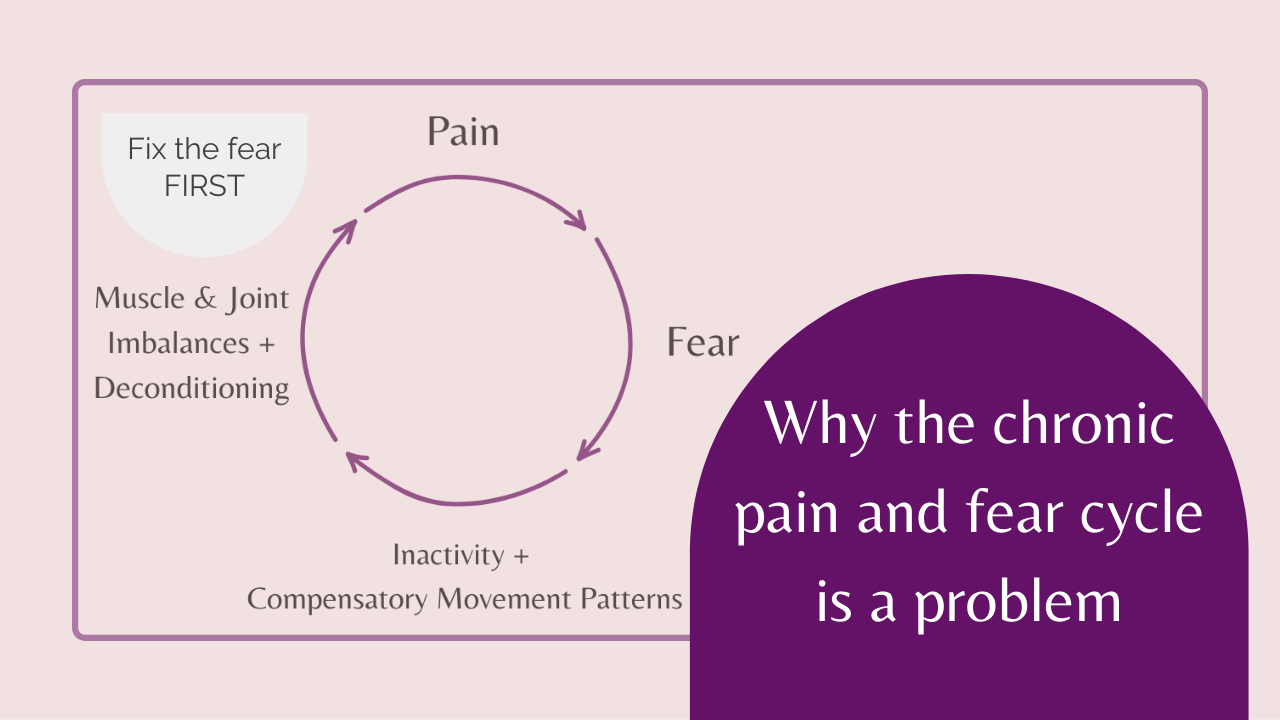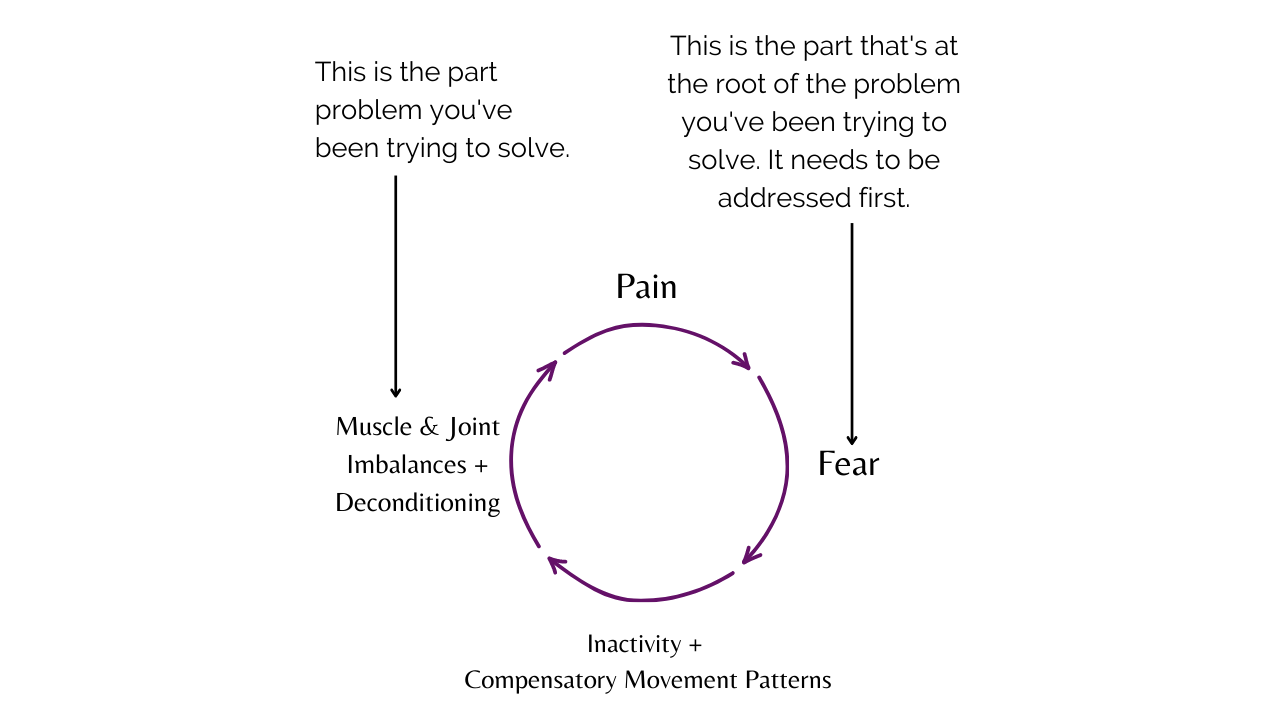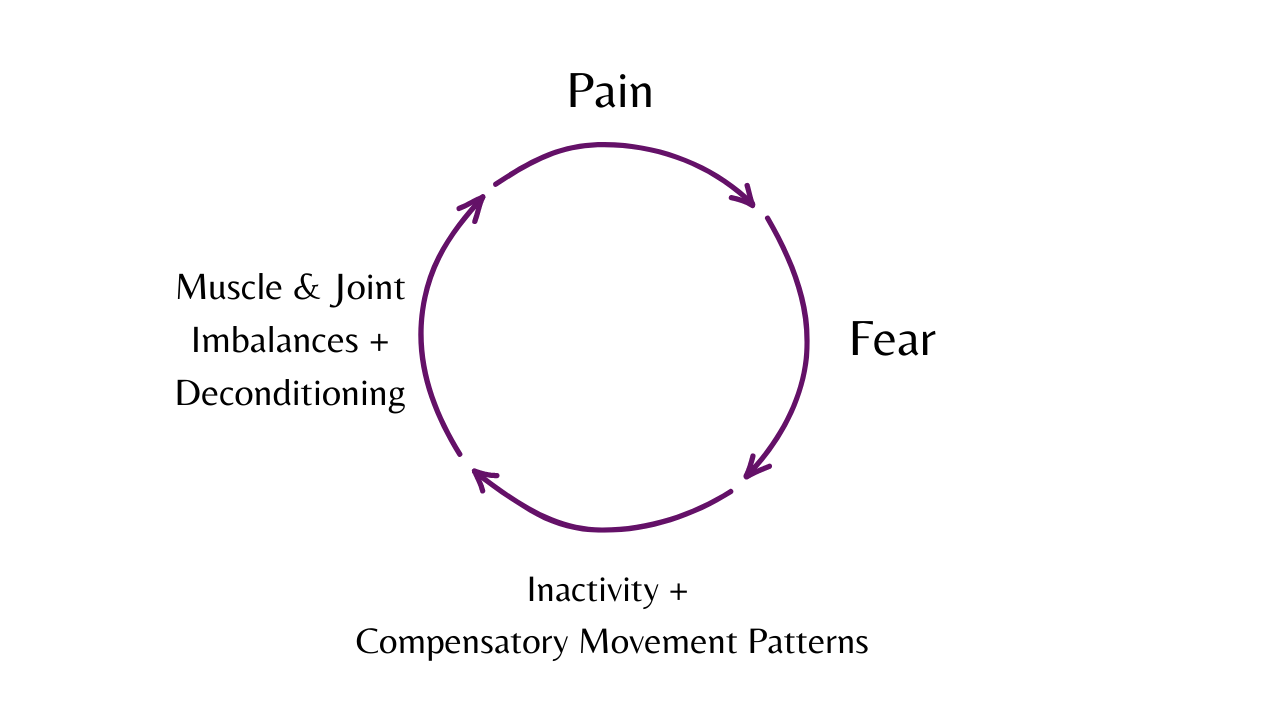Why the chronic pain and fear cycle is a problem

"When I get a flare-up I go backwards and get scared to do the things I was before"
This is one thing MANY individuals with chronic pain struggle with... it's that FEAR of the pain, fear of a flare-up, fear of what could happen next time, what you'll miss out on, and who you'll disappoint.
And that fear can essentially paralyze you into inaction. OR it causes stress, worry, anxiety -- all of which contributes to more pain.
Fear isn't something that many people recognize or want to acknowledge as part of the pain problem. Most of the time, the fear exists on a subconscious level.
But fear and anxiety are inseparable from pain. Which means that in order to get in control of the pain, we first need to get in control of the fear.
The reason why nothing has worked is because we need to address the fear and anxiety that's underlying the pain before we can force our bodies into training that involves movement.
If you have chronic pain and struggle with fear, we're going to take a deeper look at that relationship between fear and pain in this article. Plus, I'll share what you need to do to reduce that fear in order to actually get a handle on pain.

There are 3 main reasons why we need to address fear first:
1. That fear, on a subconscious level, is going to prevent you from moving freely.
If your brain doesn't think your body is safe and you ignore the fear and do the activity anyway - your brain is going to prevent you from moving normally.
In other words, moving with fear leads to compensatory movement patterns.
Think of it this way, if you're afraid you have a push pin in your shoe, wouldn't you walk a little differently to protect your foot?
In the same way, if you have a fear that squatting will cause pain and you do it anyway, wouldn't you subconsciously move in a more protective manner?
This happed to me... Over 15 years ago I injured my shoulder and to this day, I subconsciously do not swing my arm when I walk. My subconscious brain has modified my movement as a means to protect me.
2. Fear and pain are tied together on a neurologic level.
It has to do with the way our brains are wired AND our fight-or-flight responses.
Pain and fear are both symptoms of a fight-or-flight response, just like anxiety and panic are symptoms of a fight-or-flight response.
They are the ALARMS your body uses to alert you to a threat, or when the body thinks there's a threat, in order to get you to take action.
The amygdala, the fear center in our brains, lights up during a pain experience and also drives fear.
We feel more panic, stress, and anxiety because the other physiologic fight-or-flight responses are kicking in - increased heart rate, blood pressure, breathing rate, and muscle tone....
Over time, when we have a hypersensitive nervous system that starts activating our fight-or-flight response, the brain makes a connection between fear and pain and the two become synonymous.
3. Fear leads to inactivity and avoidance.
Fear is a survival response. It tells us to avoid the things that are scary or dangerous, that threaten us, or make us feel uncomfortable.
Fear of pain and flare-ups drives us to avoid movement and activity.
For many, this leads to inactivity. It leads to avoiding certain movements and activities.
Unfortunately, avoiding movement and activity results in deconditioning, weakness, muscle imbalances, decreased circulation, decreased endurance, decreased activity tolerance, and eventually depressed mood.
Additionally, avoiding movement and activity also validates those fears. Rather than addressing the fear, we're reinforcing it and allowing it to continue.
Some say the answer to managing pain is building strength and activity tolerance to strengthen the muscles and joints of the body.
While exercise is a good thing if you have pain caused by weak muscles or joints, if the movement or activity makes pain worsen, it only keeps you in the fear and pain cycle, reinforcing fear and exacerbating pain.
Before we can work on strengthening or building up activity tolerance and endurance, we need to address fear first.
Here are 3 ways we can do that:
- We need to fill in the information gaps because when the brain doesn't know something it automatically assumes the worst. - You need to know why you hurt before you can heal.
- We need to practice strategies that will calm the nervous system down, to reduce the fight-or-flight response, take the foot off the gas and put it on the brakes.
- We need to gradually address the fear by doing the things that we're afraid to do because of the pain, but in a way that will not cause the pain to get worse.
In the end, I know you don't want to be told to manage your stress and I have nothing against stress management strategies but you need to know HOW to tackle your specific pain-related fear and pain-related anxiety before you can beat the pain.

This is a complex process and it's not something you have to go through on your own.
This is the kind of thing we indirectly work on in my program, the Chronic Pain Breakup Method.
To learn more about how to minimize your pain-related fear, so you can get more control over you pain, set up a time to chat with me today so we can see how we might be able to work together to beat your fear and pain - so you can live a fearless and fulfilling life.
Click here to set up a free call today: https://www.alissawolfe.com/book-call
Get Pain Articles & Neuroscience Nuggets Sent To Your Inbox.
Subscribe to my Blog!






